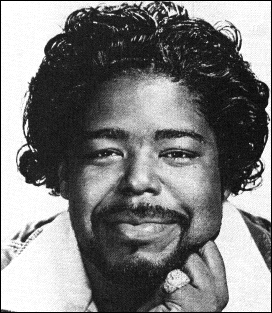
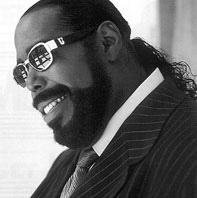
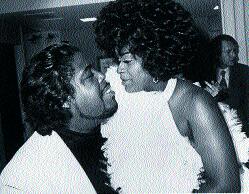
Put together from various information on the internet by Carlos Gutierrez.
With credit noted for the information obtained form each accordingly.
"THE MAESTRO"
Barry White
THE MAN! US GUY'S FAVORITE WOMAN ROMANCE SEDUCING MUSIC MAKER.
& of course the Ladies Man
R&B Great Barry White Dies at 58 (September 12, 1944 - July 4, 2003)
Barry White, the honey-voiced baritone known for his sultry, romantic songs, dies at a hospital in Los Angeles.
White, 58, had been in poor health for several years and died while awaiting a kidney transplant.
The soul singer became a star during the disco era, but had a resurgence in popularity in recent years.
He won two Grammies for his 1999 album, "Staying Power."
BARRY WHITE provided the soundtrack for many rolls across many water beds in the 1970s.
Tidbits; Though he was
born in Galveston, Texas, he grew up in the high-crime areas of South Central
Los Angeles, California, where he
joined a gang at the age of 10, and
subsequently, at 17, was jailed for four months for theft of $30,000 worth of
Cadillac tires.
After being jailed, 17-year-old White left gang life and began a
musical career at the dawn of the 1960s in singing groups before going out on
his
own in the middle of the decade. In 1969, he found his break backing up
three talented female singers into a girl group called Love Unlimited.



Lyrics to the following BARRY WHITE songs.
|
My first, my last, my everything My first, my last, my everything |
Just the Way You are. Don't go changing, to try and please
me |
Never gonna give you up. [Aahh] |
|
|
||
Barry White RIP!
|
Sexiest lyric:: "I don't wanna see no clothes / I don't wanna see no panties / And take off that brassiere, my dear"
Barry White Never Gonna Give You Up Music via Noolmusic.com
Practice what you preach Video.
Barry White - Practice What You Preach via Noolmusic.com
Hung Up In Your Love
Barry White - Hung Up In Your Love via Noolmusic.com
My first, my last, my everything. Live concert.
Barry White Concert 3 Eme Partie Events via Noolmusic.com
Barry White's Orchestra, Love's Theme
Barry White Orchestra Loves Theme Music via Noolmusic.com
|
Other images and information.
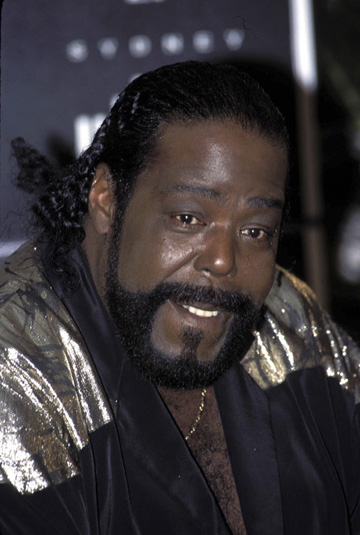
The Interview 1988 PEOPLE
Barry White Interview 1988 People via Noolmusic.com
August 13, 2006 Singer Barry White performs at the opening ceremony for AIDS 2006, the 16th International AIDS conference in Toronto, .
More Information.
|
Barry Eugene
White was born on 12 September 1944, in Galveston, Texas, the eldest of two
children. His birth at Galveston was entirely due to his mother visiting
relatives and extending her stay there. Back home in California, he was raised
in Watts, Los Angeles, along with his brother Darryl who was born thirteen
months later.
Darryl was to
be murdered in a meaningless Gangland killing on 5 December 1983 which
devastated Barry who later remarked "Believe me, life is very cheap in that
world. It's crazy, but he only died over two dollars." As children the two
brothers doted on each other and were best friends; indeed their mutual nickname
'Burly' was a slip of the tongue as the infants tried to say 'Buddy'. They were brought up by their mother, actress Sadie Marie Carter, who appeared in the 1931 movie "Trader Horn”. She and their Father Melvin A. White, never married and didn't live together as such. Barry recalled, "When I started school, my Father saw my birth certificate and noticed my Mother's surname on it. Well, he just scribbled out 'Carter' and wrote in his own, 'White'."
Brought up in a musical household, Barry remembered being taught to harmonise by his Mother at the age of four. "Mama was singing 'Silent Night' and I sang the counterline; that's when music came into focus. I was fine-tuned; I stayed glued to the phonogram when Mama played her records; symphonies, sonatas, melodies soaring through me. Darryl loved fighting but I loved violins. I was drawn to the mystery of sound. Even though Mama taught piano, I never learnt to read or write music.”
Seduced by the sound of Mama playing "Moonlight Sonata” on a used upright she
paid $50 for, Barry recalled "It was so beautiful watching that Taurus Queen
play that piano. She tried to teach me the scales but I told her I wanted to
learn it my way. One of the greatest gifts she gave me was when she said
'Okay"".
Barry sang in
his Baptist Church Choir, played the organ and soon went on to arrange their
music. He played piano on “Goodnight My Love” by Jesse Belvin at the age of
eleven and was paid $55 for the session. Later, as an early teenager, his
trademark voice became apparent. "It changed when I was 14', he said later, 'I
woke, up and spoke to my Mom and the whole of my chest vibrated. She was in
shock!" he laughed. As well as his Mother, radio played a great part in the Maestro's early life and he built up quite a record collection by burgling people's houses to satiate his appetite for music. "I only stole the good ones!" Barry mischievously remarked on television in 1993. Early Years
Convinced
that music would be his life Barry left school at the age of fifteen, “I quit
High School on my birthday; it was my senior year and I didn't see the point. I
was ready to make music." But first he had to tame the rebellious streak which
would later engulf Darryl's life, getting into trouble with the law and serving
seven months at Juvenile Hall for stealing $30,000 worth of Dual 90 Cadillac
tyres. The dehumanising side of this experience affected him deeply, and he
explained “While I was in jail, I came to grips with owning up to my mistakes
and made up my mind to never hand my freedom over to anyone else again in my
life."
When some of Barry's school-friends formed the R & B group The Upfronts in
1960, he sang Bass (“Although I never wanted to be a singer"), and wrote songs.
Soon after touring the L.A. club scene with the Upfronts, he sung and recorded
with the Atlantics and the Five Du-Tones.
By now
spellbound with the magic of the recording studio, Barry learnt his craft as
engineer, producer and all-round musician, and was soon able to play every
instrument presented to him, with the exception of strings and horns. His first
taste of success came in 1963 and his involvement with Bob and Earl on "Harlem
Shuffle”, during the sessions of which he met arranger Gene Page.
At this time
Barry was married to his childhood sweetheart, with four children and eager to
make a living to support his family. The marriage was not to last and ended in
divorce in 1965 (when Barry was 21) after a six year romance. A publishing deal
with Downey Music in 1966 led to a single "Man Ain't Nothin'' flipped with "I
Don't Need It" under the name 'Lee Barry' although the composer and arranger
credit is Barry White. This was to be the first ever Barry White solo release.
He was
contracted to produce an album for Danny Wagner ‘The Kindred Soul Of Danny
Wagner' (Imperial) in 1966, featuring Barry White singing backgrounds on a
rework of “Harlem Shuffle” and lead vocals on “My Buddy” which has appeared on
lots of early-material CDs ever since. Around the same time, he became A & R
(Artist and Repertoire) man for the Mustang/Bronco labels and was commissioned
to produce several acts including four Viola Wills and three Felice Taylor
singles in 1966/67. Viola would not hit the charts until 1979 (with "'Gonna Get
Along Without You Now"), but Barry took Felice into the US Billboard charts with
“It May Be Winter Outside” (later revived by Love Unlimited) and the UK charts
with "I Feel Love Comin' On", both in 1967.
At that time,
Barry was also licensing productions to UNI records, with two Lori Hampton 45s
to his credit. Motown aficionados will be interested that he produced the
legendary Brenda Holloway, under the assumed name Brendetta Davis, on the single
“Until You Are Gone” c/w “I Can't Make It Without Him” on Liberty records in
1968. However, we have been informed that Brendetta en Brenda are two different
singers (although we belive they knew each other). It is true to say that Brenda
Holloway was a long-standing favourite of Barry's and in fact later appeared as
a backing vocalist on the most of his A. & M. albums.
Just as it seemed Barry was on the verge of success at Mustang/Bronco, the
label folded in 1969 and he went back to the drawing board, surfacing to write a
song for the Hanna-Barbera TV series ‘The Banana Splits' in 1969. The tune
“Doin' The Banana Split” – not nearly as bad as the title sounded - appeared on
the show and this lucrative move kept Barry's finances afloat. In 1970 he
released “Little Girl” flipped with a raw R. & B. cover of Elvis's "In The
Ghetto" under the pseudonym Gene West.
Also in 1970,
he wrote and produced the first recording of the classic “Your Sweetness Is Your
Weakness” for Jackie Lee on UNI. Barry's connection with Jackie Lee lasted over
a decade, as Jackie also recorded as Earl Nelson (of Bob & Earl) and Jay Dee on
the Barry White-produced 1974 album ‘Come On In Love'.
Back in 1968,
while sitting in on a Motown recording session with Gene Page producing, Barry
met three backing singers and wanted to know whether he could work with them, as
he "just knew the girls had got what it takes.” The singers were Glodean James,
her sister Linda, and cousin Diane Taylor... Love Unlimited. By 1969 he
started work and rehearsed them for over two years and in 1971 met Russ Regan of
UNI records who eventually signed Love Unlimited to the label.
In the spring
of 1972 they unleashed the first single, "Walkin' In The Rain With The One I
Love”, during which Barry's trademark deep-voiced talkover is heard for the
first time. This became a worldwide smash, reaching Top Twenty status in both
the US and UK.
Within months of that smash and its hit album ‘From A
Girl's Point Of View…' (the first by Love Unlimited), Russ Regan was head-hunted
by the newly reactivated 20th Century records, and Russ encouraged Barry to move
across with him and take Love Unlimited to the new label.
Barry began
looking for a male vocalist to record his own songs, and indeed had demoed
several songs to launch this new artist. Everyone who heard these demos urged
Barry to release them himself. Eventually, he was persuaded to sign with 20th
Century as a solo artist. The first sessions resulted in his debut Gold album
‘I've Got So Much To Give' and the lead single, “I'm Gonna Love You Just A
Little More, Baby", which became the fastest-selling single in 20th Century's
history. The Maestro with the "Love Unlimited Orchestra" Singers.
The next triumph came with the second Love Unlimited album, 1973's ‘Under the
Influence Of...' From its day of release US radio DJs flipped over “Love's
Theme”, the instrumental piece which opened the album, and demanded its release
as a single. Now, credited to The Love Unlimited Orchestra, the track smashed
its way to Number One on the US chart, and reached the Top 10 in 25 countries
around the world. Simultaneously, both Barry's second album, ‘Stone Gon'' and
the single “Never, Never Gonna Give Ya Up”, made the Top 20 on both sides of the
Atlantic, with the LP making his British album chart breakthrough.
On the back
of “Love's Theme”, the second Love Unlimited album soared to No. 2 on the
Billboard Albums Pop chart, and as such the trio became the first female group
ever to chart that high with a regular album. Through Love Unlimited, Barry
finally got due recognition for some overlooked classics, “It May Be Winter
Outside” and “Under The Influence Of Love”, which both reached the Billboard Hot
100. The backing track to Smoke's 1971 single “Oh Love (Well We Finally Made
It)” (MoSoul) was employed on the same album to create the definitive version of
the tune. Barry revisited this song himself on his ‘Can't Get Enough' album,
the only instance of Barry and Love Unlimited recording the same song.
Now among the elite of hit-makers throughout the world,
it was time for the Orchestra to do a full album, and the Gold-selling ‘Rhapsody
In White' in 1974 was the result; Barry's growling introductions becoming a
trademark and providing the blueprint for many classic albums. Following the
low-key ‘Together Brothers' soundtrack, Barry was to reach the dizziest heights
in September 1974 with the release of his third solo album, 'Can't Get Enough',
and the lead-off single “Can't Get Enough Of Your Love, Babe”. Both reached the
top of the American charts and the UK Top 10. The follow-up single, "You're
The First, The Last, My Everything”, became a Number One in the UK and many
European countries, and became his anthem in concerts.
He married
Glodean James of Love Unlimited in October 1974 and they became the hippest
couple in showbiz. Pictures of Glodean's four-inch nails accompanied most of
their press stories when Barry, Love Unlimited and the Orchestra came to the UK
in 1975 on a triumphant world tour. White Gold
The years 1973-75 were a bumper period for Barry White
music. His sound was all over the radio and the burgeoning ‘Disco' scene. In
addition to his own, Love Unlimited and the Orchestra releases at that time, he
produced one-off albums for many other artists. These are Tom Brock ‘I Love You
More And More' (20th Century), Jay Dee ‘Come On In Love' (Warner Bros.), Evan
Pace ‘Face To Face' (Blue Thumb), Gene Page ‘Hot City' (Atlantic), Gloria Scott
‘What Am I Gonna Do?' (Casablanca), Westwing ‘Westwing' (20th Century) and White
Heat ‘White Heat' (RCA), all of which are highly collectable today.
Between 1973
and 1979 Barry White, Love Unlimited and the Love Unlimited Orchestra released
20 albums on 20th Century records, almost all of which achieved at least Gold
status in America. He sold $16 million worth of records in 1974 alone and the
New York Times reported that Barry was responsible by some for the so called
‘Baby Boom' in the mid-Seventies, “Not me personally, but my music!" Barry
teased.
Barry's long
list of hits achieved classic status, with discs such as "Love's Theme”, "Can't
Get Enough Of Your Love Babe", “Let The Music Play”, “What Am I Gonna Do With
You", "It May Be Winter Outside", “You See The Trouble With Me”, "It's Ecstasy
When You Lay Down Next To Me”, “Just The Way You Are” and “Don't Make Me Wait
Too Long”, becoming a virtual soundtrack to the Seventies.
Yet this extraordinary success could not be maintained and in 1979 Barry
sensed the tide was turning and set about building as much independence as the
music business would allow by forming Unlimited Gold records. He took the
company for distribution to CBS, and intended the label to be a vehicle for
himself, Love Unlimited, the Orchestra and newly signed talent.
From the beginning, Unlimited Gold failed to live up to
its promise, as internal wrangling and executive politics sidelined Barry's
dream. Indeed, CBS in the UK declined to release a single from each of Barry's
LPs ‘Beware!' ‘Change' and ‘Dedicated', which stifled album sales. But all the
other acts fared even worse.
Barry persisted with the label which went on to issue
fourteen albums in total; five by Barry, a further album in a duet with Glodean,
two by Love Unlimited, three by the Orchestra and one each by his singings Danny
Pearson and Jimmie and Vella Cameron and a Greatest Hits compilation.
However, only
Barry's albums registered any US sales, and mostly they could only edge into the
top half of Billboard's Top 200 Albums. But of the ten released in Europe, not
one reached the UK charts and the label closed its doors in 1984 with hardly a
murmur.
The
mid-Eighties brought personal tragedy in the death of Diane Taylor of Love
Unlimited after a long illness with cancer. The group disbanded when she became
too ill to tour although Glodean continued to appear on stage with Barry in his
concerts. Barry was also devastated by the death of brother Darryl and took
these events as a sign to look at where his life was heading both personally and
professionally.
After taking
stock he soon became aware that hip-hop, rap and swingbeat were the new
flavour. With echoes of his days with Mustang/Bronco, Barry set about mastering
the new technology as he learnt how to program drum machines and synthesisers,
spending several days a week; sometimes twenty four hours a day buried deep
inside the recording studio. He later remarked "I was used to going into the
studio with ten guys; now I had to learn how to go in there with one machine. I
was locked into one style of recording ... in the middle of my forties I had to
shift my mind without losing my soul."
During his
time away, Barry White's huge influence on music from the Seventies onwards
became acknowledged by fellow artists and music critics alike. His talking
introductions were the forerunner to Rap; the full-length album versions of hit
singles predated the 12" by several years; the instrumental B-sides - which he
started in 1967 - became the blueprint to "Dub' mixes twenty-five years later;
and his backing tracks would be sampled by acts as diverse as Mary J. Blige and
Robbie Williams.
It was now
time to relaunch his career and his return to recording came with a new A. & M.
contract signed in 1987. Straight away his hit-making days resumed with the UK
Top 20 single "Sho' You Right" and the album "The Right Night and Barry White".
This was followed by a triumphant world tour in 1988 which tied-in with Barry's
return to the UK Top 5 album charts. 'Barry White: The Collection' assembled
many of his Seventies hits with the addition of "Sho' You Right” and the Paul
Hardcastle Remix of "Never, Never Gonna Give Ya Up". This title has gone on to
be the most durable compilation of any in UK chart history.
His reputation with the hip-hop audience soared through a one-off duet with
Big Daddy Kane, “All Of Me”, which became a Gold American single. Another
triumph came with Barry's appearance on the Grammy-winning "The Secret Garden"
from Quincy Jones' album ‘Back on the Block', which was also certified Gold.
1989 closed with the release of the acclaimed album 'Barry White: The Man Is
Back!'
The Man Is Back
Barry blasted
into the Nineties with his third A. & M. album, 1991's ‘Put Me In Your Mix',
selling strongly is America, with the title single becoming his biggest R. & B.
bit for a decade, peaking at #2 on the Billboard R & B chart. Later that year,
the duet with Isaac Hayes, "Dark and Lovely", also did well.
In 1992 Barry
was on another hugely successful UK tour where he met long-time admirer Lisa
Stansfield at the Hammersmith Odeon. Shortly afterwards Barry sang "All Around
The World" with Lisa on BBC-2s "Rapido" and reaction was such that they recorded
it as a B-side to one of her hits. Lisa remarked "one of my biggest heroes is
Barry White” and had previously dedicated her "Affection' album to him. She
went on to have a hit with her own version of “Never, Never Gonna Give You Up”
in 1997 and duetted with Barry again on his last album ‘Staying Power', on the
song “The Longer We Make Love”.
Yet despite all this activity, in many ways this was a sad time for Barry, as
old endings and new beginnings charted this phase of his life and career. He
separated from Glodean in 1988 although never divorced her. He discreetly
closed the door on that chapter of his life would never discuss their
relationship, except to later invite people to listen to the song “Whatever We
Had We Had” from 'The Icon is Love', and said "It's all there, if you really
want to know". He and Glodean remained good friends for the remainder of
Barry's life.
Further
upheaval came following the 1993 earthquake that destroyed his L.A. home and
R.I.S.E. studios, from where Barry moved to Las Vegas and then to Encino in
California to subsequently live with his long-time companion Katherine Denton.
By 1994 Barry had sensed there was greater potential for his recordings, and
embarked upon using outside producers for the first time. However, it was
important that he work with people sympathetic to his style and method of
recording. Gerald Levert, Jimmy Jam and Terry Lewis had no difficulty augmenting
Barry White and long-time collaborator Jack Perry.
The resulting album, 'The Icon Is Love', astonished
observers with its sure-footed blend of modern and traditional, as the
now-classic "Practice What You Preach” single became his first International Top
20 hit in over a decade and the album quickly amassed over four-million sales
world-wide.
A new
generation of listeners caught up with Barry's magic and he became much
in-demand on TV shows and in interviews. He appeared on the ‘Late Show with
David Letterman' several times up to 1999 and starred as himself in episodes of
the ‘Ally McBeal' and ‘The Simpsons'. He also found time to write his
autobiography, ‘Love Unlimited: Insights On Life & Love' with Marc Eliot.
For a while
there was speculation that a new group Love U II, ‘a new Love Unlimited for the
90s', featuring Glodean and sister Linda James, would surface, although no
recordings were issued and it's probably correct to say that nothing made it
past the demo stage.
The late
Nineties saw Barry sign a new recording deal with Private Music and in 1999 his
final album, ‘Staying Power', was released. Featuring Puff Daddy, Lisa
Stansfield, and Chaka Khan, this Gold-selling album garnered Barry two Grammy
Awards in 2000 (his first), for Best Male R&B Vocal Performance for the song
"Staying Power" and Best Traditional R&B Vocal Performance for the album
‘Staying Power'.
Sadly, Barry had been suffering from poor health for some time, and years of living with hypertension and diabetes took its toll, forcing him to cancel several dates of his last World Tour in 2000. His health further deteriorated and he was hospitalised towards the end of 2002, suffering a stroke on 1 May 2003 from which point he was awaiting a kidney transplant. Barry died on Friday 4 July 2003 at around 0930 PST at the Cedars-Sinai Medical Centre, the cause of death given as kidney failure, brought on from years of high blood pressure. At the time of Barry's death, he was preparing a "duets" album for release during 2003, that would have been a fitting legacy to a true Giant of Soul. However, to date, this material has never appeared.
Barry's musical heritage continues with his children
who survive him, many of whom followed him into the business: LaNese, Denise,
Nina, Shaherah, Barry Jr., Darryl, and his stepchildren, Bridget and Kevin. He
is also survived by Katherine Denton and her child she named Barriana. Let The Music Play Forever
A phenomenon spanning over four decades, the legendary
Barry White carved a unique place in the hearts of music fans across the World.
His success was truly international, reflected by more than 100 Gold and 38
Platinum record awards. We will always share a little love in our hearts for
Barry White: writer, arranger, producer and super smooth vocalist. His
influence on music has been awesome, and will continue to be so.
Exalted as
‘The Sultan of Soul', ‘The Man', and ‘The lcon of Love' ... Barry White was and
forever will be ... The Maestro
|
Another story;
| Formed to be another version of the legendary
Motown girl group The Supremes, the group would mold their talents with
White for the next two years until the group and White were signed to
contracts to 20th Century Fox Records. White produced, wrote and
arranged the classic soul ballad, "Walking in the Rain (With The One I
Love)". The song hit the Top 20 of the pop charts. The group would score
more hits throughout the '70s and White eventually married the lead
singer of the group - Glodean James. While working on a few demos for a
male singer to sing, the record label suggested White step out in front
of the mic and not so much in the background. White reluctantly agreed
and the rest, as they say, is music history. His hits included "I'm
Gonna Love You Just a Little More Baby" (1973), "Never, Never Gonna Give
You Up" (1973), "Can't Get Enough of Your Love, Babe" (1974), "You're
the First, the Last, My Everything" (1974), "What Am I Gonna Do With
You" (1975), "Let the Music Play" (1976), "Your Sweetness is My
Weakness" (1978), "Change" (1982), "Sho' You Right" (1987), and
"Practice What You Preach" (1994), among others. He had been ill with chronically high blood pressure for some time, which resulted in renal failure in the autumn of 2002. He suffered a stroke in May 2003, after which he was forced to retire from public life. He died in Cedars-Sinai Medical Center in the West Hollywood area of Los Angeles at the age of only 58. His death was reported as being from renal failure. Late in his life, White wished to be remembered as a good person who happened to be able to sing. White's autobiography, ''Barry White: Love Unlimited'', was written with Marc Eliot and published by Broadway Books in 1999. Barry White's music was frequently showcased on the late-1990s television show ''Ally McBeal''; the show often used esoteric references to what was going on inside character's heads. In this case, John Cage (played by Peter MacNicol) would hear Barry White sing whenever he was sexually aroused. The use of his music on the show served to revitalize his career, and White eventually made a guest appearance in the show.
|
Another reading text.
He also won a whole new audience when his music was used in the hit television comedy series Ally McBeal, in which White once appeared.
'True master'
Don Cornelius, founder of US music TV show Soul Train, remembered White as "a true master".
"There was no match for Barry White. His music is just going to live forever, it's not limited to disco or soul or hip-hop or anything."
He said White's lyrics were directed toward his second wife, Glodean James.
"Love was a very important aspect of his life," Cornelius said.
"He wasn't just singing for your mate and your bedroom, he was singing and writing for his own bedroom."
Cornelius said when he visited White in hospital two months ago, the singer was almost completely incapacitated.
"The man really suffered, at times he was full of tubes. If it wasn't for the
fact that he was
an abnormally strong man, he would've been gone a long time
ago."
|
White's second wife Glodean was said to have inspired his lyrics |
Sam Moore, of 1960s soul duo Sam and Dave said, "He didn't have
to do like the average, jumping all over the stage.
He could just stand there
with his big orchestra and he could just mesmerize."
Despite being unable to read or write music, White sold more than 100 million records.
He won belated recognition for his success in 2000 when he won his first two
Grammys for best male and
tradition R&B vocal performance for the song Staying
Power.
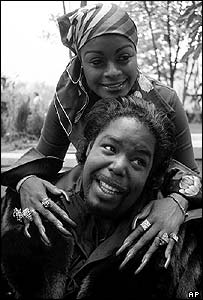
Ill-health
But his comeback was dogged by ill-health. A problem with chronic blood
pressure led to him cancelling several live performances with
the group Earth,
Wind and Fire in 1999, and he was admitted to hospital.
The following year, fans in Sydney said he looked unwell on stage during a show, and many booed him and demanded refunds.
White, who was brought up in Los Angeles' South Central area, was fond of
telling how his
famous gravelly voice appeared overnight when he was 14.
"I woke up, and spoke to my mother, and scared us both to death," he said when he addressed the Oxford Union in 2000.
A spell in jail for stealing tires when he was a teenager convinced him to
enter the music industry in
1960, inspired by the Elvis Presley song It's Now Or
Never.
In 1983 his brother Darryl, who he called his "best friend", was shot and killed by a neighbor in a dispute over change from a $20 note.
White maintained that if he had not entered the music industry, he may have suffered the same fate.
Barry White Discography: Album
|
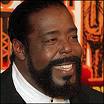
ONE of My TOP Personal Favorite Singer! May "Barry White" Rest in Peace.
|
Reference Web Site: |
|
| Official Site; | |
| Other sites; | |
CLASSIC LIVE MUSIC VIDEO CLIP BELOW, SELECT YOUR CHOICE TO VIEW BELOW.
THIS SITE IS UNDER REVISIONS, CHECK BACK FOR MORE INFORMATION THAT WILL BE ADDED AS AVAILABLE.
Thanks you for your visit.
NOTE;; Article's credits for the information and images as noted for each.
To see basic info on "The Love Unlimited Orchestra"
To read Bio of Marvin Gaye Here.
Income Resort Caribbean Investments @ Pre-construction Prices. View properties here!
Make Your Investment a Paradise to Enjoy While You Earn! Access to what Millionaires know!